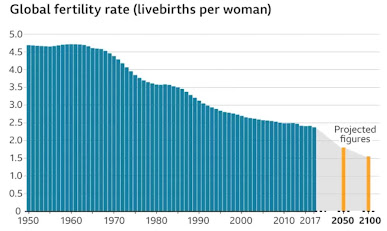As if the world didn’t have enough of Elon Musk’s musings, he recently made the news with the claim that population decline is a greater problem than climate change. He was quoted as saying (which I must admit is a somewhat clever turn of phrase) "If the alarming collapse in birth rate continues, civilization will indeed die with a whimper in adult diapers."
The global birthrate is indeed declining. The graph below shows the change over the last 70 years. It has basically been cut in half.
Developed countries have seen their birthrates fall particularly quickly, as seen in the second graph. Japan has had such a rapid decline that it is predicted that their population will be cut in half by the end of the century. They are particularly vulnerable because they do not generally allow immigration.
It is interesting to compare Musk’s dire warning with previous hysterias that have posited almost exactly the opposite point of view. In the early 1800’s Robert Malthus developed a theory that population growth would overwhelm the world’s ability to produce food and that a natural collapse due to famine and/or war would result. He argued that population growth is exponential whereas the growth of resources is more linear. At the time, any curbs on fertility such as birth control were considered immoral so the birthrate would naturally approach exponential growth.
Malthus described what has since been termed the ‘Malthusian Trap’ - that technological progress in agriculture and industry would allow human population to explode and eventually outpace production of food.
When one looks at the history of population growth in human society it is not hard to believe that Malthus was correct on the effect of technology on population. See the graph below:
The danger of over-population was embraced and ratcheted up several notches by Paul Ehrlich in the 1970’s with his explosive book ‘The Population Bomb’. The opening paragraph read:
The battle to feed all of humanity is over. In the 1970s hundreds of millions of people will starve to death in spite of any crash programs embarked upon now. At this late date nothing can prevent a substantial increase in the world death rate.
Paul Ehrlich appears to have been a bit hyperbolic in his prediction, but his description of the stress that a growing world population puts on resources and the environment was prescient.
So, who is right? Are we facing imminent disaster from over-population or is civilization going to implode due to a declining birthrate? Well, both!
The problem with a declining birthrate is that it has the potential to create nations of old people who drain resources while a diminishing number of young workers struggle to support them and keep the economy afloat. This is a very real danger and is already having significant effect in Japan.
The problem is not with a lower birthrate, but with how rapidly the birthrate decreases. Stability is the key word here. Given how desperate the global warming crisis is, there is no doubt that the world would be better off with less people demanding energy and using up natural resources. There is no a priori need for world population to continue growing to prop up the economy and maintain civilization. But if it slows down too rapidly, the economic and social/cultural effects will be de-stabilizing and possibly catastrophic.
The best method for stabilizing populations and gradually reducing total population would be to allow more fertile immigrants from lands where climate change, poverty and political instability are rampant into countries where lower birthrates are threatening to have destructive consequences. This would kill the proverbial two birds, and even a third, with one stone – solve immigration problems, stabilize declining populations, and mitigate climate change. The sad fact is that such a remedy is completely out of the realm of possibility in these times of populism, authoritarianism and governmental paralysis. And so it goes.



No comments:
Post a Comment